
AI tools are transforming how businesses operate, offering solutions to reduce manual tasks, improve workflows, and cut costs. This guide highlights six AI platforms - Prompts.ai, Diaflow, Lindy.ai, Make (formerly Integromat), monday work management, and Zapier AI - and their features in interoperability, workflow orchestration, governance, and cost efficiency.
Key Takeaways:
Each platform has unique strengths, from enterprise-grade AI orchestration to simple tools for small teams. Choose based on your business size, integration needs, and budget.
Quick Comparison:
| Tool | Best For | Key Features | Pricing Model |
|---|---|---|---|
| Prompts.ai | AI-driven workflows | 35+ LLMs, pay-as-you-go TOKN credits | Usage-based |
| Diaflow | Mid-sized automation | Visual builder, API integrations | Usage-based |
| Lindy.ai | Small teams | Admin task automation, HIPAA compliance | Scalable pricing |
| Make | Advanced scenarios | Workflow builder, conditional logic | Flexible tiers |
| monday work mgmt | Project management | Pre-built templates, role permissions | Per-seat pricing |
| Zapier AI | High app connectivity | 6,000+ apps, chatbot triggers | Pay-per-task |
Choose the tool that aligns with your goals, simplifies processes, and keeps costs under control.
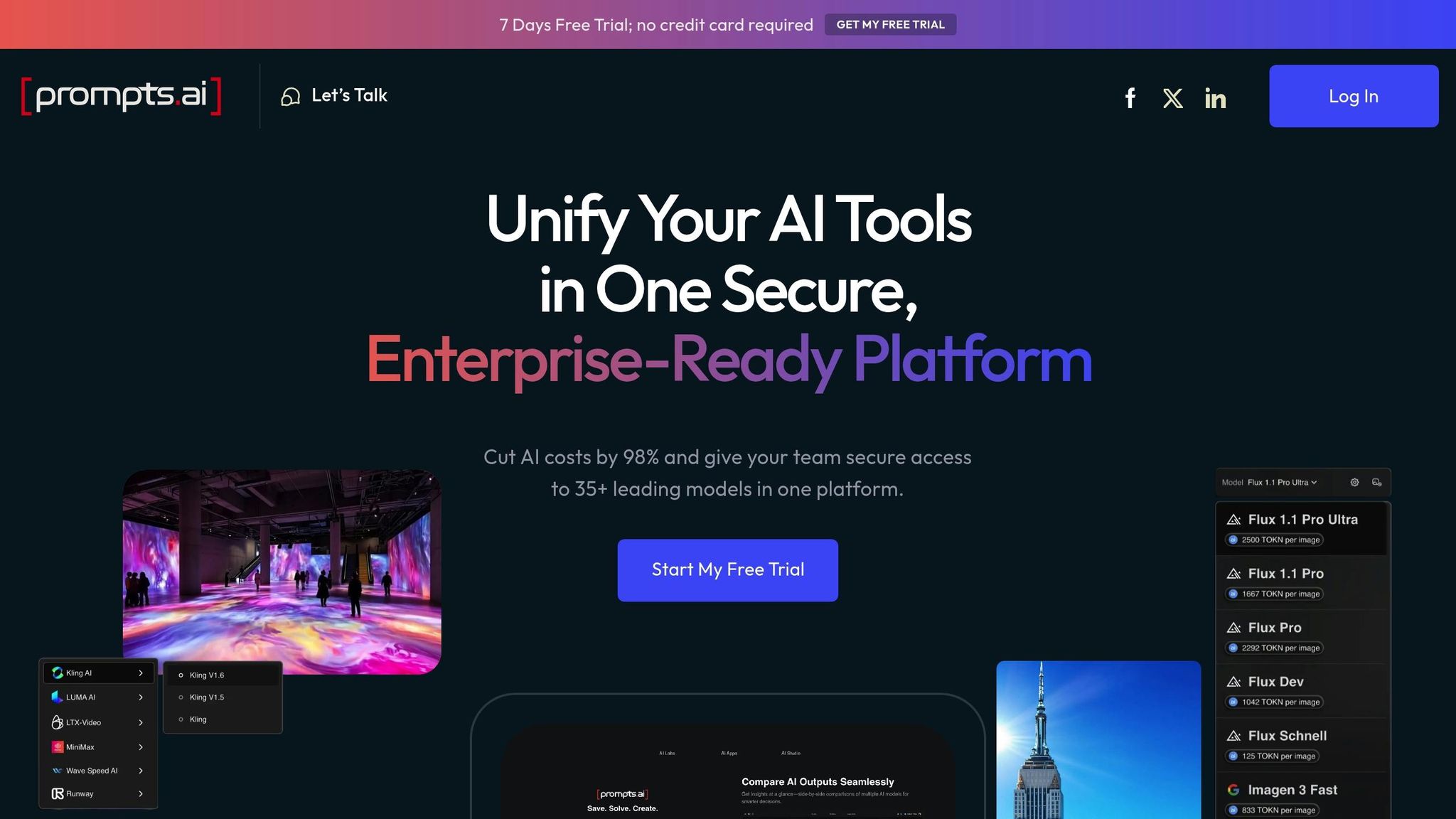
Prompts.ai serves as a robust platform designed to simplify and scale AI automation for enterprises. By bringing together over 35 leading language models - including GPT-4, Claude, LLaMA, and Gemini - into a single, secure interface, it eliminates the chaos of managing multiple tools, making AI adoption smoother and more efficient.
Prompts.ai seamlessly integrates a range of AI models into one secure environment, offering teams a consistent and straightforward way to access various solutions. This eliminates the hassle of juggling multiple vendor relationships or dealing with complex API setups. Teams can easily switch between models to meet specific task needs without reworking their workflows, ensuring compatibility with existing systems. This unified approach also encourages the development of standardized, repeatable workflows.
The platform turns one-off AI experiments into structured, repeatable processes. Teams can create and share standardized prompt workflows to maintain consistent quality and results across projects. Prompts.ai also features "Time Savers" - ready-to-use, customizable templates crafted by experts to speed up AI automation and reduce deployment time. To further enhance internal expertise, the Prompt Engineer Certification program equips organizations with the skills and best practices needed to manage AI workflows effectively, making automation deployment even more efficient.
Governance is a key focus of Prompts.ai, offering tools to monitor and control AI operations with precision. Audit trails document every AI interaction, providing the transparency needed to ensure compliance with internal policies. The platform also prioritizes data security, safeguarding sensitive information throughout the AI processing pipeline and ensuring a controlled, secure environment for enterprise use.
Prompts.ai delivers clear insights into AI spending with its granular cost tracking. By monitoring token usage, finance teams can directly connect automation investments to business outcomes. The pay-as-you-go TOKN credits system replaces traditional subscription fees, aligning costs with actual usage. This model allows businesses to cut software expenses by up to 98%, consolidating multiple AI tools into a single, scalable solution that charges only for the resources used.
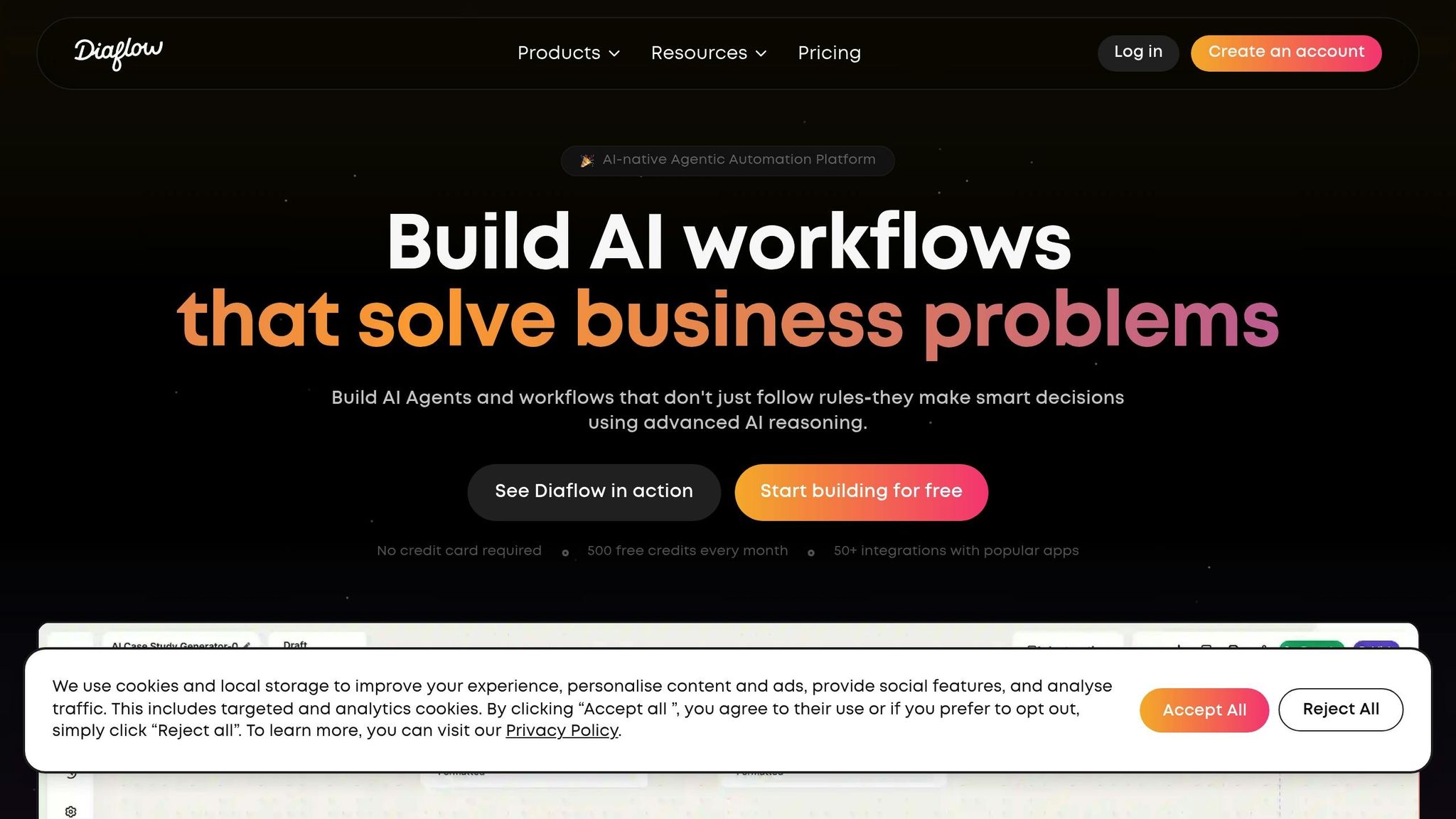
Diaflow streamlines intricate business processes with an easy-to-use drag-and-drop interface. It brings AI-powered automation within reach for users without technical expertise, all while maintaining enterprise-level functionality. Let’s dive into its standout features.
Diaflow is built to meet the demands of modern automation by seamlessly integrating with popular business tools like CRMs, marketing platforms, and financial software. Its adaptable design allows teams to connect custom-built applications and even older legacy systems with minimal effort. By uniting data from various sources into a single workflow, Diaflow enables cross-platform automation that eliminates barriers between departments.
The platform’s visual workflow builder makes it easy to design even the most complex automation sequences. It supports conditional logic, data transformations, and AI-powered decision-making at every step. Additionally, users can execute multiple workflow branches simultaneously and rely on version control to track and manage changes effectively.
With its usage-based pricing model, Diaflow scales alongside your operational needs, ensuring affordability. Built-in monitoring tools help identify inefficiencies, fine-tune workflows, and minimize the need for manual intervention, ultimately saving time and resources.
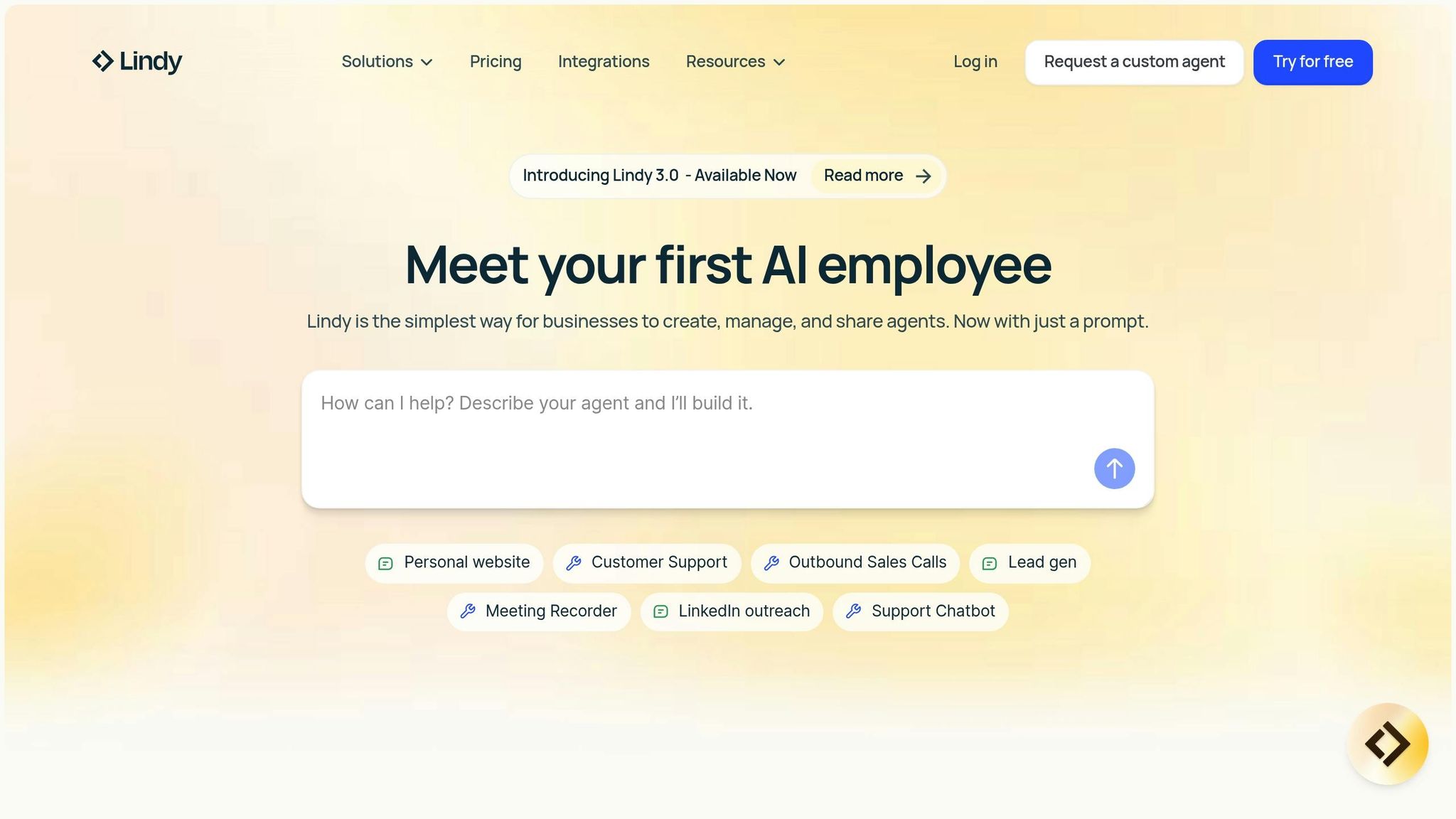
Lindy.ai is a platform designed to simplify and automate administrative tasks for small teams. It takes on routine responsibilities like sorting emails, scheduling meetings, updating CRMs, and recording call notes, offering businesses a practical way to scale operations efficiently.
One of Lindy.ai's standout features is its ability to work seamlessly with existing systems and various data inputs. Unlike rigid rule-based systems, Lindy.ai uses natural language processing to handle complex scenarios and edge cases. This makes it especially useful for businesses managing diverse customer interactions or navigating intricate data processes. Its smooth integration paves the way for effective workflow automation.
Lindy.ai includes a user-friendly, drag-and-drop workflow builder that supports multi-step logic and retains context for advanced no-code automation. A human-in-the-loop control system adds an extra layer of security by allowing users to review outputs before they are executed. This ensures that critical processes receive proper oversight while routine tasks are handled automatically. Additionally, Lindy.ai's AI agents maintain context across multiple interactions, improving the flow of ongoing communications. The platform pairs these workflow tools with strong security measures to protect every step of the process.
Lindy.ai is built with stringent security and compliance features, making it a reliable choice for U.S. businesses handling sensitive information. It holds SOC 2 Type II certification, demonstrating that its security practices are regularly tested and independently verified. For healthcare providers, Lindy.ai meets HIPAA compliance standards, with specific controls tailored to HIPAA requirements. By 2025, it will also be approved for use in U.S. clinics managing sensitive health data. Additionally, the platform complies with PIPEDA, reinforcing its commitment to data privacy.
"At Lindy, we prioritize security and ensure your data is protected at every level. With industry-leading certifications and a robust security framework, Lindy provides enterprise-grade security and compliance tailored to your business." - Lindy.ai Security & Compliance Overview
Lindy.ai uses AES-256 encryption to secure data at rest, TLS 1.2+ for data in transit, and benefits from Google Cloud Platform's multi-zone redundancy and automated patches. Other features include role-based access control (RBAC), multi-factor authentication, and 24/7 security monitoring. For businesses utilizing its phone functionalities, Lindy.ai adheres to U.S. telecommunications regulations, including the Telephone Consumer Protection Act (TCPA), CAN-SPAM Act, and Do-Not-Call Implementation Act.
Lindy.ai offers a scalable pricing model tailored for small teams, making it a cost-effective choice without requiring a significant upfront investment. Its advanced contextual understanding reduces false positives and troubleshooting, saving both time and money. The human-in-the-loop feature further minimizes costly mistakes by allowing teams to set review thresholds for critical or high-impact automated actions. These features combine to provide small teams with a reliable and error-resistant automation solution.
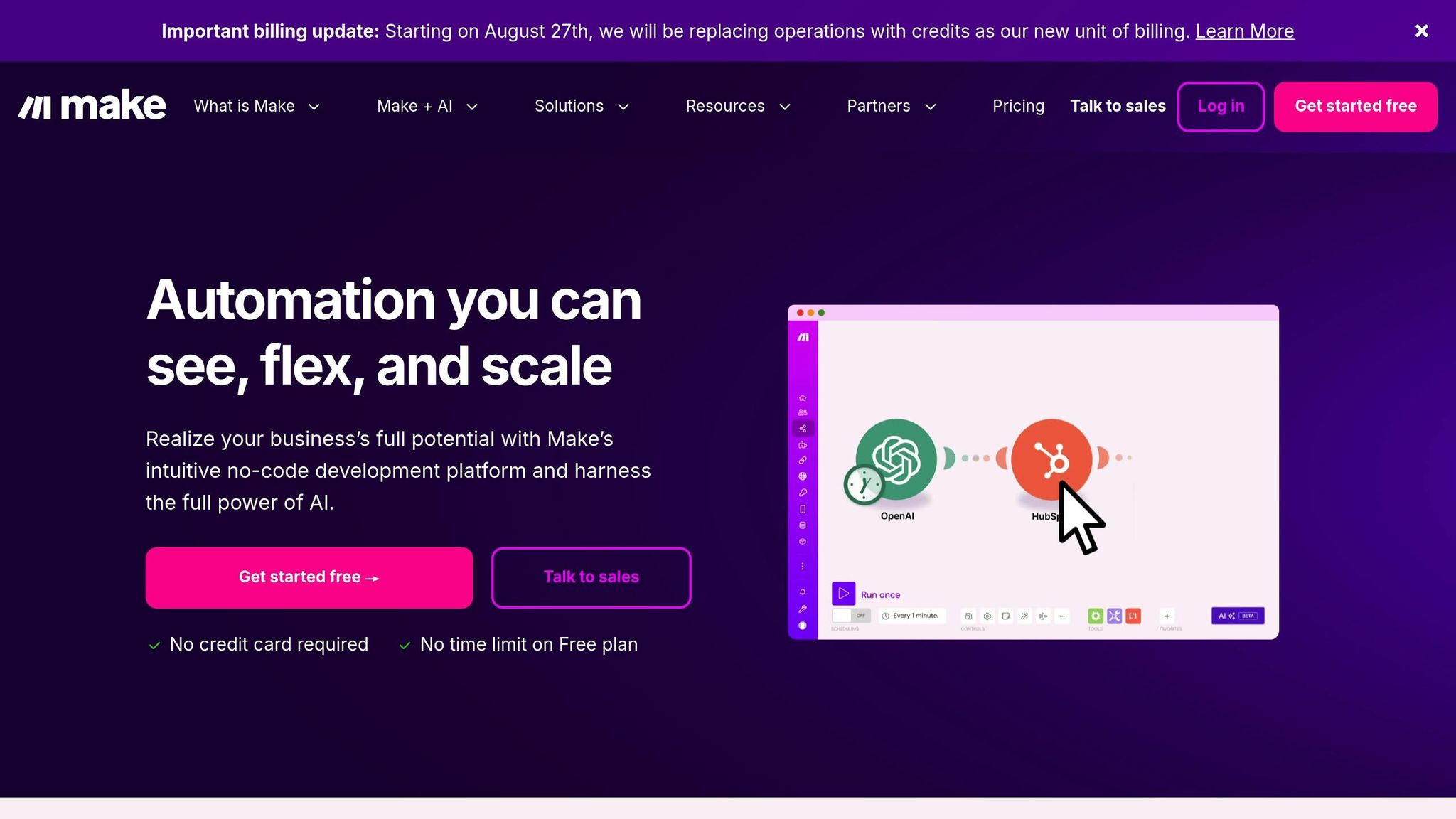
At this time, verified details about Make's integration capabilities, workflow orchestration, and pricing are not available. We are actively working to gather accurate information and will update this section as soon as it becomes accessible.
Having a clear understanding of these features is crucial for businesses evaluating AI automation solutions. While this section is pending updates, it highlights the difference in available insights compared to other platforms covered here. Stay tuned for more information.
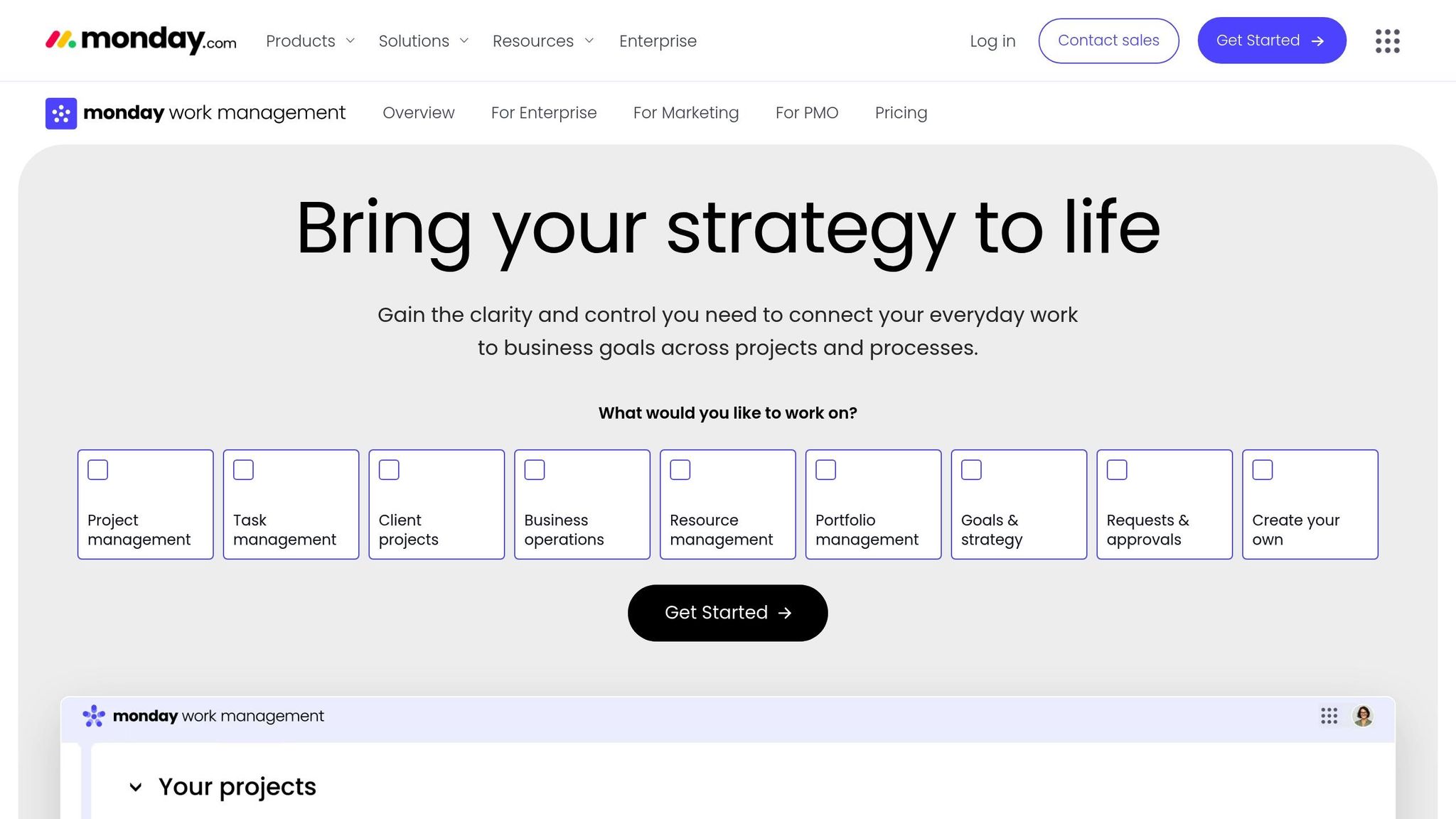
monday work management is a visually-driven project management platform designed to incorporate automation into everyday business operations. Its array of integrations and automation features highlights its role as a tool for creating seamless AI-driven workflows.
This platform integrates effortlessly with key tools like Slack, Microsoft Teams, Google Workspace, and Salesforce. Through native integrations and a customizable API, it ensures smooth data exchange across systems.
Its pre-built automation templates cater to various departments. For instance, sales teams can automatically generate project boards when deals are finalized in their CRM, while marketing teams can initiate campaign workflows based on lead scoring data from external tools. By connecting different functions, monday work management eliminates data silos, enabling faster and more efficient business processes.
The platform's automation engine simplifies complex workflows with its intuitive visual tools. Teams can use conditional logic to set up actions triggered by specific criteria, such as assigning tasks based on workload or expertise. This streamlined approach ensures processes remain efficient and well-organized, supporting governance and compliance needs.
monday work management prioritizes secure operations with advanced permission settings that limit access to sensitive information. Administrators can establish approval workflows requiring managerial sign-off for specific actions, ensuring oversight without sacrificing automation benefits. Additionally, detailed audit trails log all activities, making compliance reporting straightforward.
With competitive pricing plans, monday work management helps businesses save time and resources. Its automation tools reduce the need for manual administrative work, while the intuitive dashboard shortens training and onboarding periods. Together, these features contribute to smoother operations and increased productivity.
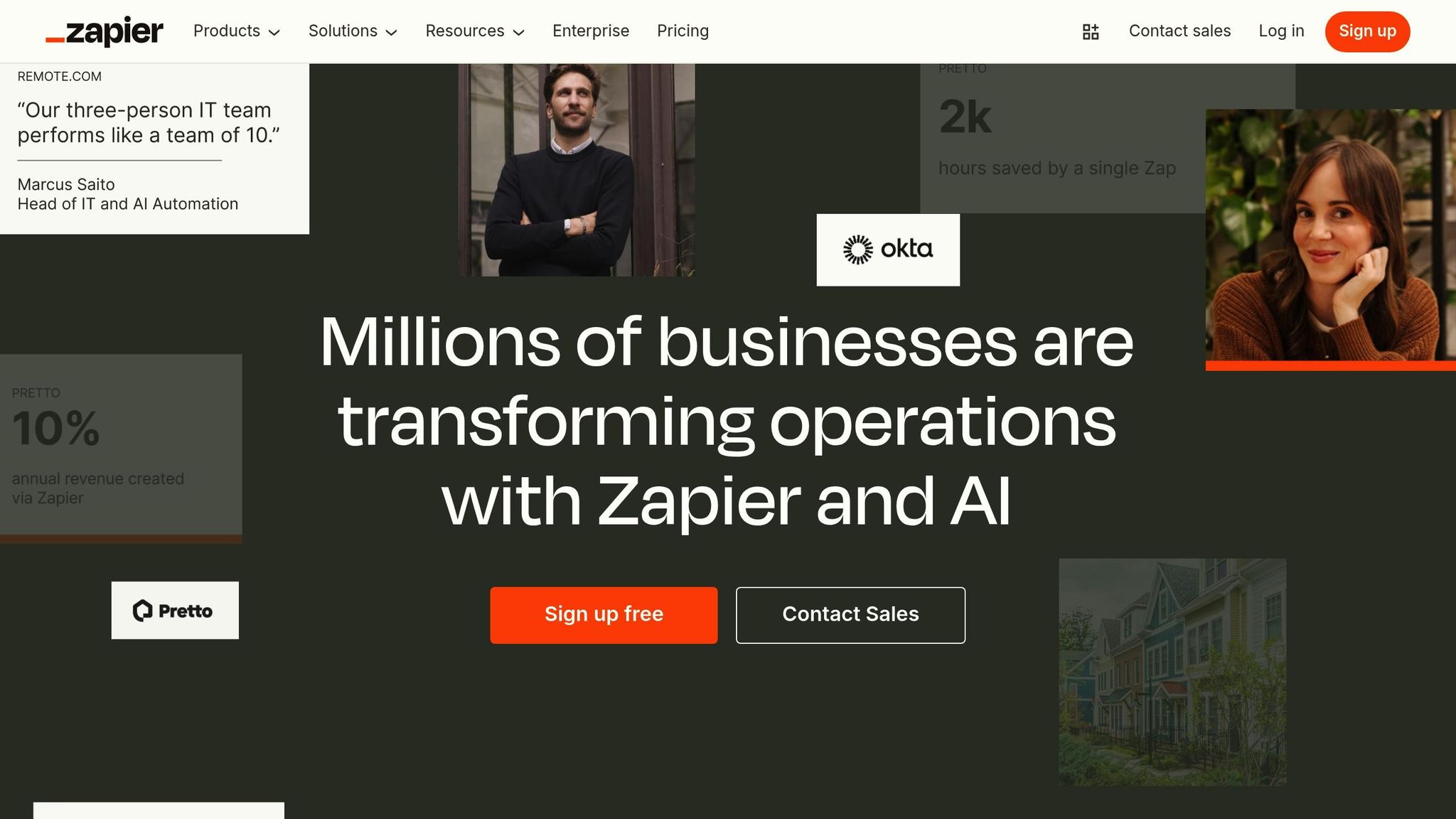
Building on the robust automation capabilities of platforms like monday work management, Zapier AI takes integration to the next level by seamlessly connecting thousands of business applications. With tools like Zapier Chatbots and Zapier Agents, the platform simplifies complex workflows and boosts operational efficiency by automating tasks and creating smooth data flows across various systems. By eliminating the need for manual data handling, Zapier AI ensures businesses can focus on strategic priorities while its intelligent features handle the repetitive, time-consuming tasks.
Zapier AI boasts connectivity with over 6,000 business applications, making it one of the most extensive integration platforms available. This connectivity allows businesses to link tools like CRM systems, marketing platforms, accounting software, and communication tools - all without requiring custom development. Its universal API approach ensures smooth data exchange across applications, breaking down operational silos and fostering better collaboration across teams.
Zapier AI’s AI-powered agents are designed to handle multi-step workflows, adapting to real-time changes and business needs. With support for conditional logic and data transformations, the platform enables intelligent decision-making throughout automated processes. Its chatbot feature allows users to trigger complex automation sequences through natural language commands, making advanced workflows accessible even for non-technical users while maintaining a high standard of reliability for enterprise operations.
Transparency and security are at the core of Zapier AI’s design. The platform offers detailed activity logs and audit trails for all automated actions, ensuring businesses have full oversight of their processes. Features like role-based access controls and approval workflows provide an additional layer of accountability, while robust encryption safeguards sensitive data during integrations. These measures align with U.S. compliance standards, giving businesses peace of mind when managing their data.
Zapier AI’s pay-per-task pricing model ensures businesses only pay for what they use, eliminating unnecessary subscription fees. By automating routine tasks like data entry, notifications, and cross-platform updates, the platform significantly reduces labor costs and administrative overhead. Many businesses report immediate returns on investment, as automation speeds up processes and handles thousands of tasks that would otherwise require manual effort.
With these features, Zapier AI stands out as a powerful player in the AI-driven automation space, offering businesses the tools they need to streamline operations and achieve measurable results.
When evaluating platforms for automation and AI integration, key factors like interoperability, workflow orchestration, governance, and cost efficiency play a vital role. Below, we’ve outlined the strengths and limitations of each tool to help you make an informed choice.
| Tool | Advantages | Disadvantages |
|---|---|---|
| Prompts.ai | Interoperability: Combines over 35 top language models (GPT-4, Claude, LLaMA, Gemini) into a single secure interface, reducing tool sprawl. Workflow Orchestration: Expert-designed workflows and side-by-side model comparisons streamline operations. Governance: Enterprise-grade security with audit trails and compliance controls. Cost Efficiency: Pay-as-you-go TOKN credits can cut AI costs by up to 98%. |
Primarily focuses on AI/LLM automation, which may require additional tools for broader workflow automation. |
| Diaflow | Interoperability: Strong API connections with various business applications. Workflow Orchestration: Offers a visual workflow builder with drag-and-drop functionality. Governance: Includes built-in approval processes and user permissions. Cost Efficiency: Competitive pricing for mid-sized businesses. |
Has a steeper learning curve for complex automation and fewer advanced AI features. |
| Lindy.ai | Interoperability: Smooth integration with popular business tools and CRM systems. Workflow Orchestration: Relies on natural language processing for easy automation setup. Governance: Tracks user activity and provides basic compliance tools. Cost Efficiency: Affordable entry-level pricing for small businesses. |
Struggles with enterprise-scale operations and offers limited customization for complex workflows. |
| Make (formerly Integromat) | Interoperability: Extensive app ecosystem with a wide array of connectors. Workflow Orchestration: Advanced scenario building with conditional logic and error handling. Governance: Detailed execution logs and team collaboration features. Cost Efficiency: Flexible pricing tiers based on usage. |
Steep learning curve and higher costs for large-scale usage. |
| monday work management | Interoperability: Integrates natively with numerous business applications. Workflow Orchestration: Project-focused tools for timeline and milestone tracking. Governance: Role-based permissions and robust reporting dashboards. Cost Efficiency: Predictable per-seat monthly pricing. |
Geared mainly toward project management, requiring additional tools for complex data transformations. |
| Zapier AI | Interoperability: Connects with an extensive network of business applications. Workflow Orchestration: AI-powered agents enable multi-step workflows using natural language commands. Governance: Detailed activity logs, audit trails, and role-based access controls. Cost Efficiency: Pay-per-task pricing aligns costs with actual usage. |
Costs can rise significantly with high-volume automation, and advanced features may need technical expertise. |
When selecting a platform, consider the balance between interoperability and cost efficiency alongside your operational needs.
For organizations focused on AI orchestration, Prompts.ai offers standout features like unified management of multiple language models, expertly crafted workflows, and significant cost savings through its TOKN credit system. These features make it particularly appealing for enterprises aiming to streamline their AI operations.
If extensive third-party integrations are a priority, Zapier AI and Make provide strong options, though their costs can escalate with higher usage. For businesses with a project management focus, monday work management is an excellent choice, though it might require additional tools for handling more complex workflows.
Meanwhile, Diaflow and Lindy.ai strike a balance between accessibility and functionality, making them suitable for smaller businesses or teams seeking straightforward automation without the complexities of enterprise-scale deployments.
Pricing models also vary: Prompts.ai and Zapier AI scale with usage, while tools like monday work management offer predictable costs through per-seat pricing. Governance features range from basic compliance tools in Lindy.ai and Diaflow to comprehensive audit trails and security measures in platforms like Prompts.ai, Make, and Zapier AI. These distinctions can help you choose the right tool for your automation and AI needs.
When choosing an AI automation solution, focus on one that aligns with your business goals, streamlines workflows, ensures strong security, and keeps costs under control. With these priorities in mind, Prompts.ai stands out as an excellent choice for businesses aiming to unify their AI operations.
For companies leveraging advanced language models and intricate AI-driven processes, Prompts.ai provides a centralized platform. It consolidates access to over 35 leading large language models - such as GPT-4, Claude, LLaMA, and Gemini - eliminating the need for multiple subscriptions and scattered tools. The platform’s pay-as-you-go TOKN credit system can slash AI expenses by up to 98%, offering a cost-effective solution for businesses of all sizes. Additionally, enterprise-grade security features, real-time FinOps cost controls, and built-in audit trails ensure compliance with strict regulatory standards while supporting scalability. These features align with the broader emphasis on seamless integration, secure governance, and efficient cost management.
Prompts.ai's pay-as-you-go TOKN credit system provides a smart and budget-friendly way to manage AI costs. Instead of locking businesses into fixed subscription fees, this system charges only for the resources actually used, cutting out unnecessary spending and offering the flexibility to scale AI usage as needed.
With the potential to lower AI-related expenses by up to 98%, this approach is perfect for companies focused on managing budgets efficiently while still leveraging advanced automation tools. By tying costs directly to usage, businesses enjoy better control and clearer insight into their spending.
When choosing an AI tool for business automation, it's crucial to think about your company's size and how well the tool fits with your existing systems.
For smaller businesses, the focus should be on solutions that are easy to use, budget-friendly, and don't demand much technical know-how. It's also essential that these tools integrate smoothly with your current setup to avoid unnecessary disruptions.
Larger enterprises, on the other hand, need tools designed for scalability and packed with advanced features. Opt for platforms capable of managing complex workflows, processing substantial data volumes, and working effortlessly across multiple systems. Selecting tools that align with your specific business needs will lead to more efficient automation and better outcomes over time.
Prompts.ai prioritizes data security and regulatory compliance by incorporating robust safeguards such as enterprise-grade encryption, multi-factor authentication (MFA), and comprehensive audit logs. These tools work together to protect sensitive information and ensure access is tracked and controlled with precision.
The platform also adheres to global standards like ISO/IEC 42001:2023, which focuses on managing risks throughout the AI lifecycle. This framework helps businesses maintain responsible AI practices while staying aligned with regulatory demands, giving you peace of mind over your data and operations.


